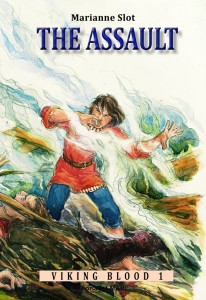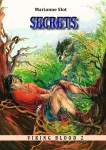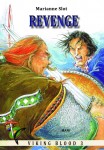Viking Blood 1: The Assault (Paperback)
€ 7,68
First book in the series “Viking Blood” by Marianne Slot.
Publishing House MARI’
Paperback
In Stock – available
In these five books Norse mythology, Viking feuds, trades, and voyages to Iceland, Shetland and Haithabu, is brought to life in an exciting story of life and death.
We follow Hauge as his life evolves around the vital consequences of that dramatic day; through vengeance and love; hardships of hunger and suffering, culminating in a final raid to England.
“Run, Hauge! Run!” Suddenly, all Hauge hears is his father’s voice, it drowns out the screams, the clashing of swords, and the roar of the fires from the torched houses. Haakon Gilmarsson and his men have attacked the village. For a split second, Hauge sees the fear in his father’s eyes and understands; this is not a request.
…..
Later the young Christian monk, Hannibal, tells Hauge that his father, Styrbjorn, has been killed in the bloody attack on their village. The conversation with Hannibal is the beginning of a lifelong friendship, and Hauge also wonders about the strange new God that Hannibal talks about.
When Hauge’s father is laid to rest, in the manner customary for a Viking Chieftain, the dumb thrall-girl Astrid is chosen to follow her master to Valhalla. Yet Hauge tries to prevent this when Astrid ”tells” him something. During Styrbjorn’s burial ceremony, Aasa, Hauge’s mother, promises her deceased husband that Hauge will avenge him when the time is right.
Hannibal and the older, stern monk, Peter, continue on their journey, but Hannibal promises Hauge that they will return.
After they have left Hauge finds an unexpected gift.
The book gives a superbly convincing picture of the Viking era. Hauge is portrayed vivid and vital, in the story that is written in an animated language. The text is easy to read and written in short sentences. Printed in a large clear type with a good layout, where the b/w illustrations create the mood and support the story really well.
The book has an appealing,colour illustrated cover.
Can be read from the age of 9years.”
Once – in southern Norway – they saw smoke rising from the sacrificial fires in Styrbjorn’s village. Suddenly a cry rang out, “Aasa has given birth to a son!”
People rushed out of their houses and gathered in a crowd outside the Chieftain’s house—the home of Styrbjorn and Aasa.
The ravens heard how happy and excited everybody was with the news. And they watched as torches were lit, and listened as people excitedly spoke of how Styrbjorn would react to the wonderful news. They supposed he was on his way back from his journey to the land of the Danes.
The birth of the Chieftain’s son was a cause for celebration. Aasa had been with child several times, but had miscarried every time. It had been suggested in low whispers that Styrbjorn ought to take a new wife, and some of the widows and young girls even held secret hopes.
Hugin and Munin returned to Odin and—sitting on his shoulders—told him what they had seen and heard. Deep in thought, Odin stroked his beard and smiled mysteriously.
Throughout the years that followed, Odin frequently sent his ravens to check on Styrbjorn’s village. Once they returned with the news that Aasa had given birth to twins. The town’s happiness was short lived, however, as the babies died soon afterwards.
Meanwhile their son, Hauge, grew up to be strong like his father and wise like his mother.
He will certainly need both those qualities, Odin said to himself.
1. The Escape
“Run, Hauge! Run!”
Suddenly, all Hauge hears is his father’s voice; it drowns out the screams, the clashing of swords, and the roar of the fires from the torched houses. Haakon Gilmarsson and his men have attacked the village. Momentarily, Hauge sees the fear in his father’s eyes and understands; this is not a request.
Under cover of the smoke and confusion, Hauge flees the village and the rampaging enemies. He runs, not noticing the ground under his feet, the trees, and bushes he passes, nor the streams he crosses. Suddenly, a large branch stops his flight and all becomes still and dark.
He comes to; someone is tickling his forehead. “Go away! Don’t! Stop it!” he mumbles, still half dazed. He waves his hand, irritated, but the tickling continues. When he opens his eyes he has to smile, in spite of the pain in his head. Leaves, from the branch he ran into, brushes against his face. However, his smile fades quickly as his mind clears.
2.Visitors
It was a good Spring Feast.
During the last few weeks, quite a few visitors had arrived. Merchants with goods to trade and relatives from the outlying farms filled the village. During the long, harsh winters, the families were isolated in the countryside, but with the spring thaw they could make the journey to the village. Most of them had brought goods to sell or trade for things they could not make themselves. Others came just to take part in the Spring Feast.
Hauge found it exciting to walk around and look at the different booths. Most of the things he knew well, such as leather goods, wooden utensils, pottery, and soapstone kettles. However, the merchants had also brought many new and unusual things from faraway lands: coloured glass in many shapes and unusual crafted silver and gold jewelery.
This year two odd-looking visitors had arrived too. They were wearing strange long, brown robes and came on foot, each with a long walking stick and a carpetbag. The eldest, Peter, told them that his God had sent him as an emissary.
It was a strange God, unknown to Hauge, who generally thought he knew all the Gods. But then, this God seemed to be a bit peculiar, and very different from the Gods he knew about.
Apparently, Styrbjorn thought this new God a bit strange too, because he had argued with Peter.
“God will punish you, Styrbjorn!” Peter said.
Styrbjorn replied scornfully, “Just one?” Styrbjorn mocked, “I have many more than that: Odin and Thor, Tyr, Njord, Freyr, and Freya! Are you really saying there is only one God? Nonsense, I never heard anything so ridiculous in all my life.”
Shortly after that, Peter hurried off to find his young apprentice, Hannibal.
Strange name, Hauge thought, but then again, they were both from a distant foreign land, far away on the other side of the sea.
The God’s punishment? There was no way Peter could have known that Haakon Gilmarsson was about to attack them, was there?
Haakon Gilmarsson was a neighbouring Chieftain from up north. A feud had been going on between the two families for ages; however, no one recalls why or when it started.
3.The Spring Feast
At nightfall, the men gathered around long tables set up in the Long House and cups were passed around. The strong mead made them loud and talkative, and the night was filled with strange and hilarious sounds.
To escape the noise and commotion, Hauge wandered off into the darkness. Behind the Long House he’d stumbled over something or someone. It was Hannibal; lying there with one of the village girls. The girl had blushed and rushed away, but Hannibal, although flustered and embarrassed, began talking to him.
He told Hauge of his long journey and life with the very strict Peter, whom he called “Master” and “Priest.” Hauge asked Hannibal how old he was.
“Eighteen,” he replied. He had followed Peter for the past two years. He also spoke of the new God they had come to teach about. In the hope that they could make people in Norway believe in this one God, they had even learnt their strange and foreign language.
“It is really difficult to learn,” Hannibal said.
Hauge liked the funny sing song way in which Hannibal spoke his language.
Hannibal also showed him the strange cross he wore under his robe. It was shiny and had a fine, intricate design engraved on it.
Hauge had told Hannibal about his Gods too. Of Odin, King of the Gods, who is recognizable by his missing eye and the two ravens who sit on his shoulders. One of the ravens is Hugin, meaning “thought,” and the other is Munin, meaning “memory.” Odin sends them out to gather information, and they return to his shoulders at nightfall; to whisper their news into his ears. This is how he knows everything that is going on; and sometimes, disguised as a wanderer, he even walks the earth himself.
Odin is also the God of war and the bringer of victory, and he receives the souls of the warriors killed in battle at Valhalla—the hall of the fallen. He also commands the Valkyries; female souls who gather the bravest of the slain warriors and bring them to Valhalla, where they will feast until Ragnarök—Doomsday. However, Odin is tricky, cunning, and deceptive, too, and uses these abilities to overcome adversaries and achieve his goals.
He sometimes starts wars by throwing his spear, or controls them by sending his Valkyries to influence the battle. That is why one has to be very careful and always keep on good terms with him.
Hauge also told Hannibal about Freyr, the God of agriculture, weather, and fertility. How they sacrifice to him, and his sister Freya, the Goddess of love, beauty, and fertility; to ensure a good harvest. The Spring Feast was held in their honour.
He had told of Thor, Odin’s son, the God of thunder and lightning, too; of Thor’s huge hammer which always returns to him when he throws it.
Hannibal listened, asked questions, and did not talk about any kind of punishment for having more than one God. They talked for some time and then returned to the village where the feast was almost over, and everyone was settling down for the night.
4. A Stranger in the Dark
Hauge stands up, confused, dizzy, and scared. The forest is not safe at night and he has no idea where he is. All the Spirits of the Night will be out and he is all alone.
He has to get back! He must find his mother and father. He is sure they have beaten Haakon and sent him running. Yes, they must have, he assures himself.
He must prove himself brave, so Styrbjorn will take him along on one of his journeys.
“This summer, when you turn thirteen, you’ll be old enough to come with me, Hauge.” Styrbjorn had said when it had still been cold and dark, and the men had filled the nights with tales of travels and adventure.
In the flickering light from the fires, Hauge had dreamed himself on exciting voyages to foreign lands. He clung to the gunwale in hard weather on unruly seas; were nearly lost in the noisy crowds of big towns and bustling marketplaces. He had even smelt the rich aromas of strange spices, and seen himself dressed in a tunic of fine, soft, cloth.
Hauge is out of breath, and his heart is pounding. He is fighting his way through the undergrowth.
Suddenly, his blood freezes. In front of him, in the dark, he sees the outline of someone or something sitting hunched on a big rock.
Is it one of Haakon’s men who has been chased into the woods? Or is it a Ghost, one of the dead? It is so quiet and still, it could well be dead. Hauge hardly dares to breathe, and his heart beats so hard it hurts.
The figure moves. Hauge almost faints with fear. He stumbles, grabs in vain for some branches, and falls over noisily.
5.The Bearer of Bad News
“Hauge, is that you?”
The voice sounds familiar, but at the same time foreign and strangely gruff. “Don’t be scared, it’s me, Hannibal.”
Hauge feels Hannibal’s arms lifting him up and hugging him briefly. They sit for a while on the rock. He is calmer now. Dawn is approaching—the darkness is slowly pushed aside by the first rays of light. In front of them is the great expanse of the sea, quiet and shining. Behind them they can just make out the ridge of looming mountains, black against the reddening sky. Everything around them seems dreamy and hazy in the billowing smoke.
Smoke!
The smell of something burning suddenly wakes Hauge from his reverie and he shudders. He can tell that Hannibal is shaking a little, too. Then he realizes that Hannibal is crying.
“I have to find my parents,” Hauge says and starts to get up. He doesn’t know what else to say, and Hannibal’s tears make him uncomfortable. Hannibal holds him back and tries to say something, but all that comes out is a jumble of mumbling words.
“My father—” Hauge begins.
“Hauge, your father—your father is—dead.” The words seem empty and unreal. He can’t understand them; he doesn’t want to.
“That’s not true! You’re lying!” he screams.
“I wish I was—I am so sorry.”
“You’re lying!” he shouts at Hannibal and hammers his chest with his fists. “You’re lying! Lying! Have you seen him? No, you haven’t! Let go of me! I have to find him!” he sobs, tears streaming down his face.



 Viking Blood 2: Secrets (E-book)
Viking Blood 2: Secrets (E-book)
 Viking Blood 3: Revenge (E-book)
Viking Blood 3: Revenge (E-book)


